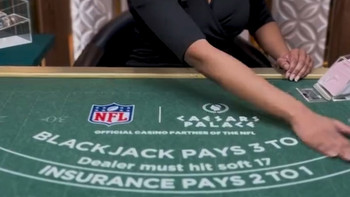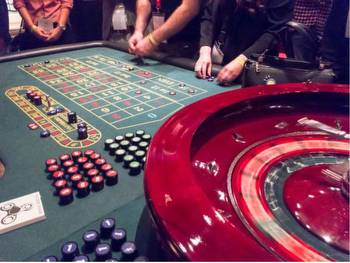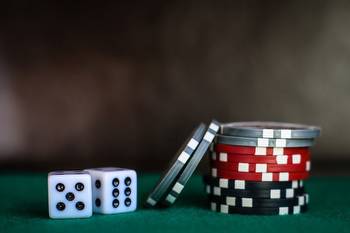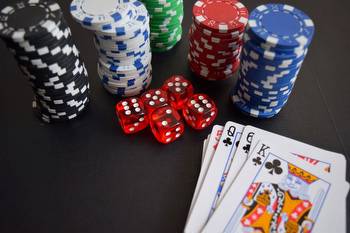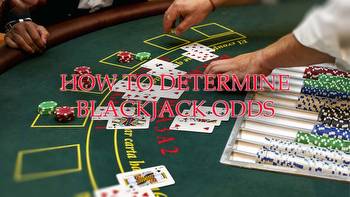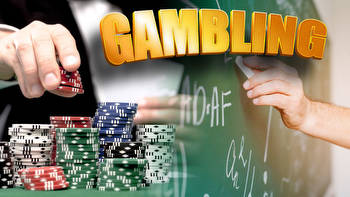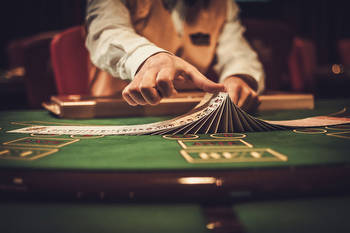Casinos: How Nerds Gamble and Win, Using the Law of Large Numbers

In last week’s podcast, “The house always wins in the long run” (June 2, 2022), Walter Bradley Center director Robert J. Marks interviewed mathematician, computer scientist, and engineer Salvador Cordova on the world of gamblers and how they try to improve their odds by physically manipulating dice (dice sliding ) and cards (false shuffling). Meanwhile, the house is relying on the Law of large Numbers, which — being a mathematical law — wins out in the end.
Sure, the Law may always win — but perhaps anyone can play it. Where we left the matter last time, in the first portion of this episode, Cordova talked about how “advantage players” try to make it work. In this second segment of the Episode 1, he goes into a little more detail.
Before we get started: Robert J. Marks, a Distinguished Professor of Computer and Electrical Engineering, Engineering at Baylor University, has a new book, coming out Non-Computable You (June, 2022), on the need for realism in another area as well — the capabilities of artificial intelligence. Stay tuned.
This portion begins at roughly 14:00 min. A partial transcript and notes, Show Notes, and Additional Resources follow:
Robert J. Marks: So tell me about advantage players. I would imagine a card counter would be an advantage player.
Sal Cordova: The advantage players are usually your math guys.
Robert J. Marks: So listen up, all you nerds. Right?
Sal Cordova: They know the odds. They have the proper skills and they’re able to turn the statistical advantage in their favor because they use their minds.
Ordinary gamblers … just kind of plop in their seat and get sawed down and beaten down by the casino. They’re like sheep being sent to the slaughter and we call them “ploppies.” So you’re either a player or a ploppie.
Robert J. Marks: I see. I want to be a player.
Why casinos hate the American Physical Society
Sal Cordova: The advantage player uses his math skills. First of all, to decide is the game beatable at all. If it’s not, then he shouldn’t play it. Now there’s an interesting anecdote to that. The worst week in Las Vegas history was when the American Physical Society had their annual meeting in Las Vegas…
After that week, Vegas lost so much money. They said, we’ll never allow them to host another conference here.
It wasn’t, ironically, because all these physicists were great gamblers. They just didn’t play. They knew that it wasn’t worth it. And so Las Vegas didn’t make any money off of them.
Robert J. Marks: Giving them free food and comps [complimentary coupons for chips, etc.].
Sal Cordova: So the first thing for an advantage player to realize is, when you can’t beat the game, don’t play it.
Robert J. Marks: I see. So they would not participate in something like roulette or craps.
Sal Cordova: There are ways to beat it, but not within the rules of the game.
Ways advantage players manipulate casinos
Sal Cordova: The casinos often give coupons to gamble. So sometimes they’ll give you free bets as an incentive…
Robert J. Marks: Or they give you free chips.
Sal Cordova: Free chips, or you buy these coupon books for, like, $14. There have been teams of advantage players that have pulled their coupons and they took the casinos for millions. Or if you work out deals.
Robert J. Marks: Oh, so a bunch of people came in, all got their coupons and gave it to some advantage player. Is that right?
Sal Cordova: They figured out that the casinos were loose with their coupons. There’s an angle. These unbeatable games — where you can actually beat them is that the casino worked out a deal that they didn’t realize was way too advantageous [to the gambler] …
But people who believe Gamblers’ Fallacies mostly lose
Robert J. Marks: Let me ask you, as a mathematician in something like craps, for example, is there anything such as a winning streak?
Sal Cordova: Yes. But since the trials are independent, you can’t use the streak to predict whether you’re going to win or lose. These are the illusory patterns that can fool people…
The belief in a winning streak is sometimes called the “Hot Hands Fallacy”: “Gambling devices like wheels and machines are programmed to produce random outcomes. This would mean that the past outcomes have absolutely no influence on future outcomes. However, some people believe that a winning streak on a single device will portend more winning. A similar belief under this casino fallacy is that certain winning numbers will re-appear more frequently than other numbers.” – “Logical Fallacies in Gambling Games”(The site discusses other Gamblers’ Fallacies as well.)
How casinos encourage Gamblers’ Fallacies
Robert J. Marks: And I’ve heard that casinos take advantage of this. One of the things they do over roulette tables is put a list of the history of the winnings, right?
Sal Cordova: Right.
Robert J. Marks: And they put — I don’t know the numbers, I’m making them up — Black 32 red, 14 green, double zero, et cetera. People look at this table and think, “Oh my goodness, black is overdue. We’ve had six greens in a row. So it has to come up black this time.” But that has nothing to do with it. It’s totally independent of the past, right?
Sal Cordova: That’s right. It’s very hard to explain to some people that over time it may work sometimes and that’s enough to make them feel that they’ve got a system and it just doesn’t work.
Some environment cues casinos also use to get you to gamble more…
How advantage players can win where Gambler’s Fallacies lose
Sal Cordova: You did ask, how can you beat these unbeatable games? Let’s say that in the craps, the past line advantage of the house against you is 1.4%. Well, if they’re giving you a 20% rebate on, on your losses, you’re going to kill the casino. And sometimes…
Robert J. Marks: And these come from the cards and the comps?
Sal Cordova: Sometimes when they have what they call a “whale.” That’s a customer that has a lot of money. They want to give them a big incentive. And sometimes they’ll make a mistake.
Sometimes they get whales who are actually advantage players. The player’s a really good con artist. He might have come in there and acted like he’s a total drunk and degenerate and just frivolous. And they’re like, “Hey, we’ll give you this 20% loss rebate. So when you have a really bad night, we’ll give you 20% of all your losses back.”
Robert J. Marks: And that’s cumulative throughout the night. Oh my goodness. Okay.
Sal Cordova: Look at the history of someone named Don Johnson who cleaned out Atlantic City:
“Don Johnson won nearly $6 million playing blackjack in one night, single-handedly decimating the monthly revenue of Atlantic City’s Tropicana casino. Not long before that, he’d taken the Borgata for $5 million and Caesars for $4 million. Here’s how he did it.” – Greg Bowden, The Atlantic (April 2012, (open access))
Sal Cordova: He did because he had this 20% loss rebate. And it was only a matter of time before his advantage started to assert itself. He got a loss rebate from one casino. And then he told the other casinos, look at the rebate this guy is giving me. And so they started upping their loss rebates while he was on a losing streak.
I think maybe he actually got lucky that, at the start, he was losing. But he had deep pockets. And so they started competing for his business because they thought he was a loser. I guess no one bothered to analyze his playing skills, which were decent enough. His Blackjack was only playing at a loss of, like, half a percent.
So then he got the winning streak. He just needed to survive until the Law of Large Numbers eventually kicked in and he cleaned out some casinos. Their monthly revenue was negative just by that one player.
Don Johnson was the ultimate advantage player:
Sal Cordova: I invite the readers to look at that. He’s an example of an advantage player actually playing a game that was “guaranteed” to lose… He could have done this with craps or anything, but they were giving him generous loss rebates.
Some of these online casinos in the early days, overseas or whatever, weren’t very sophisticated; they were offering loss rebates. I know some players who just cleaned out those casinos because the loss rebates, they realized, were too generous.They may have figured out how to have multiple accounts or something so that they could really run it up, but they became millionaires within a year.
Taking advantage of the benefits casinos offer without losing one’s savings
Sal Cordova: So these are some of the skills of the advantage players. In their repertoire is not just the game. It’s the marketing incentives — and they find it a defect. So, [readers] who want to try to beat the casinos: Maybe don’t try to do something as hard as card counting. Just look at those marketing things.
And then you mentioned the comps. If you play even an average game and don’t lose too much money, say in The Venetian in Las Vegas, you could be put up in $400-a-night suites.
Robert J. Marks: The Venetian, that’s one of the casinos?
Sal Cordova: Yes. It’s my favorite casino. It’s a real classy place. Nice and clean… I was staying in $400-a-night hotel rooms for a week. And I probably only lost like $20 on some of their games. So there are other ways to be compensated than just the cash.
There are other casinos around the land in really nice luxurious places. And if you’re an advantage player, you could get a very nice discount basically on your travels. So there are other ways to game the system, using marketing comps.
I would recommend those. It takes a lot of skill and ability to actually beat [the house] using card counting and some other techniques where you really have to be thinking and using your mind heavily. Whereas using the marketing comps, you can play an average game and you don’t have to develop a lot of the skills.
There’s skills I didn’t develop, like shuffle tracking. Those guys are just on another level of ability. One guy, every night, he would take a deck of cards and go through all of them. He’d wake up in the morning. He’d recite the sequence.
Robert J. Marks: Oh my gosh. As I get older, I don’t know if you’ve ever heard it, but the long term memory of a goldfish average is about three seconds. So I think that’s about my long term memory. I couldn’t do it overnight. We’re going to be talking to Sal about some other things in subsequent podcasts. So stay tuned.
Math nerds cheat for fun and cash but some folk just want cash (our second podcast episode with nerd gambler Sal Cordova).
This information is intended for math nerds and people entertained by probability statistics. It is not directed at anyone who has a gambling addiction. For help, see Gamblers Anonymous.
Here’s the writeup (and partial transcript) of the first segment of this podcast:
Gambling: WHY the house always win in the long run… The casinos are not cheating. They rely on the Law of Large Numbers, part of the mathematical structure underlying our universe. Robert J. Marks and fellow engineer and mathematician Sal Cordova look at the many creative methods gamblers use to improve their odds.








